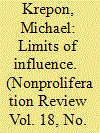| Srl | Item |
| 1 |
ID:
102386


|
|
|
|
|
| Publication |
2011.
|
| Summary/Abstract |
Even during periods of significant leverage, Washington has not had the power to stop and reverse Pakistan's nuclear trends. Pakistan's nuclear establishment has successfully deflected unwelcome US diplomatic initiatives and has been able to draw the line between necessary adaptation to, and rejection of, external pressures. Pakistan's national security managers clearly perceive that Washington's highest priorities in bilateral relations relate to the US military campaign in Afghanistan and efforts to combat terrorist groups with global reach. They presume that nuclear issues will continue to take a backseat to ongoing military campaigns in which Pakistan's assistance is crucial for America's success. This correlation of pressure and response might well change if Pakistan's nuclear activities again become front-page news. Absent this, US-Pakistani relations do not lend themselves to effective, near-term suasion by Washington on nuclear issues, whether via the 2010 US Nuclear Posture Review or other means. Pakistani leaders remain sensitive to US initiatives because Washington sets the international tone on nuclear issues. Nonetheless, Pakistan's concerns over Indian nuclear capabilities and intentions trump Washington's powers of persuasion.
|
|
|
|
|
|
|
|
|
|
|
|
|
|
|
|
| 2 |
ID:
102385


|
|
|
|
|
| Publication |
2011.
|
| Summary/Abstract |
By deemphasizing the role of nuclear weapons in US security policy, the 2010 Nuclear Posture Review (NPR) could lead India to slow or halt the growth of its nuclear weapons capabilities and to adopt a less assertive nuclear doctrine; however, the NPR is unlikely to have this effect on India's nuclear program. This is the case for two reasons. First, Indian leaders do not seek to emulate US nuclear behavior; they formulate policy based primarily on their assessment of the security threats facing India. Second, Indians do not think that the NPR augurs major changes in US nuclear policy. Thus, it will not alter the international strategic environment sufficiently to enable India to relax its nuclear posture. In fact, Indian strategists believe that the new US policy fails even to match India's current degree of nuclear restraint. Therefore, according to Indian experts, the NPR will have little impact on India.
|
|
|
|
|
|
|
|
|
|
|
|
|
|
|
|